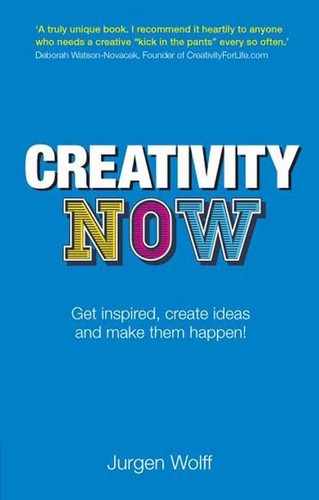THE PRINCIPLE
Assumptions about your challenge may be limiting your creativity
Every challenge has behind it a set of assumptions that seem so obvious that most people never think to challenge them. At one point it seemed ridiculous that a metal tube full of people would ever be able to fly through the air. Or how about the notion that you can type a word into a computer and in under one second up will pop millions of pages of material about that topic – crazy, right? As you can tell from these examples, breakthroughs overturn assumptions.
To challenge the assumptions around your challenge, you first have to be aware of what they are. Start the process by making a list of what ‘everybody knows to be true’ about the topic (which could be a problem, an invention, a service or just about anything else).
Let’s say the challenge is that you’ve written a book and you’d like to get it published. Some of the typical assumptions are:
- You need an agent to bring your manuscript to the attention of publishers.
- Publishers generally don’t look at unsolicited manuscripts.
- Even if your book is published, it will be difficult to get attention for it in the media if you’re not famous.
As a writing coach and lecturer, I know that these kinds of assumptions stop a lot of people from attempting to write a book, even when they have a terrific idea. So let’s at the same time challenge each assumption and brainstorm some alternatives.
Do you really need an agent to bring your manuscript to the attention of a publisher? Who else might have a connection to a publisher? How about your dentist, solicitor, gardener, university lecturer or insurance agent? The ‘six degrees’ notion that we are no more than six links from reaching anybody has been proven – can you make it work for you? What would happen if you started asking everybody you deal with whether they have any connections to a publisher?
Next, what might make a publisher more receptive to considering your manuscript (other than a personal connection)? If you wrote an article on your topic for a major newspaper or magazine, would that be a way to get their attention? If you researched the major publishing executives using the resources of the internet, do you think you might find one who has some specific interest in your topic? For instance, if your book is about growing up poor in a small town, which publisher has a similar background? If your book is about improving one’s golf game, which publisher is an avid golfer?
Finally, is it really impossible to get media attention for your book even though you’re not well known? Perhaps you can take advantage of the fact that the media love stunts. One author of fantasy fiction arranged for a ‘dragon foetus’ to be discovered (with the help of a company that made it out of wax and an accomplice who pretended that he found it in the effects of his grandfather, who supposedly worked at the Natural History Museum). The author’s book, Unearthly History, had been rejected by 36 literary agents and 7 publishers, but after the stunt Allistair Mitchell published it himself and got an exclusive distribution deal with Waterstone’s and a three-book deal with the American branch of HarperCollins for £100,000.
As you can see, the rewards of questioning assumptions can be considerable!

